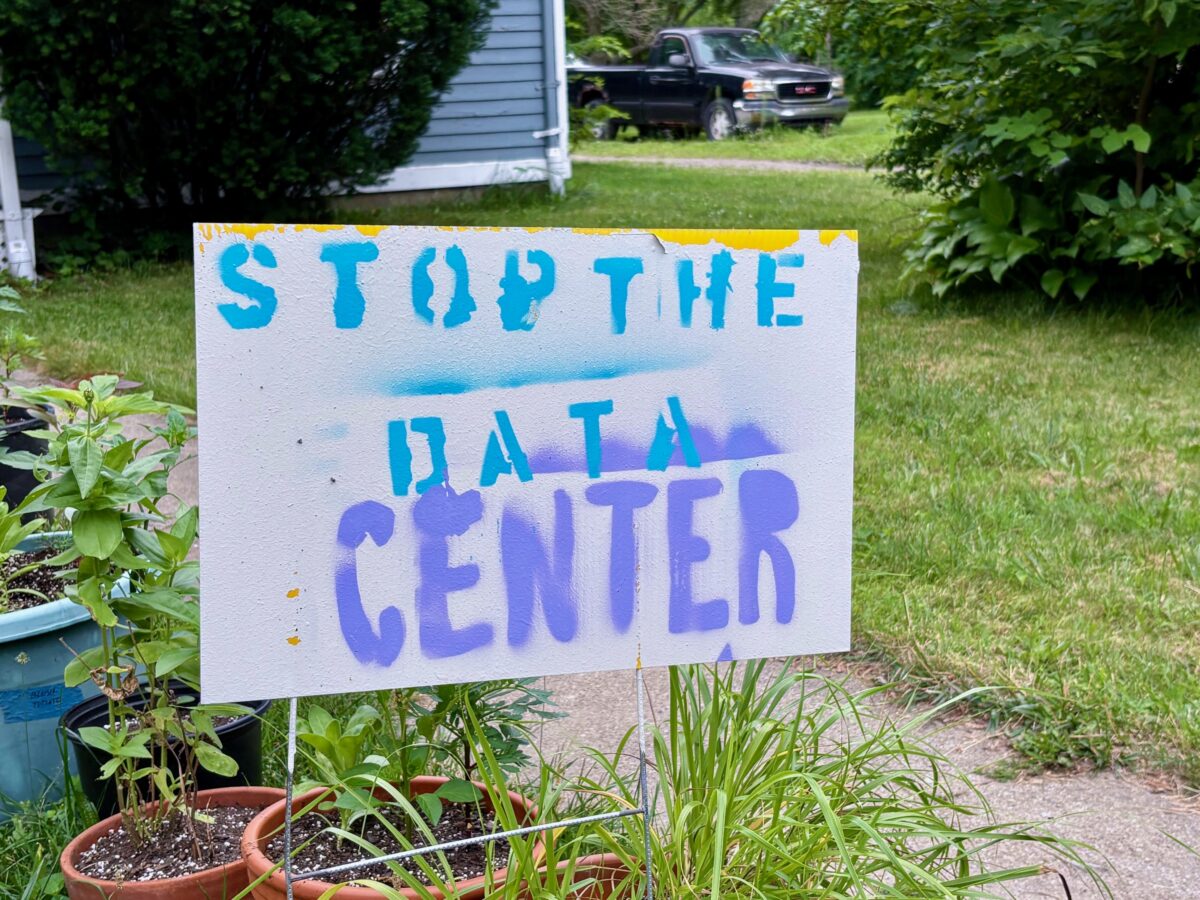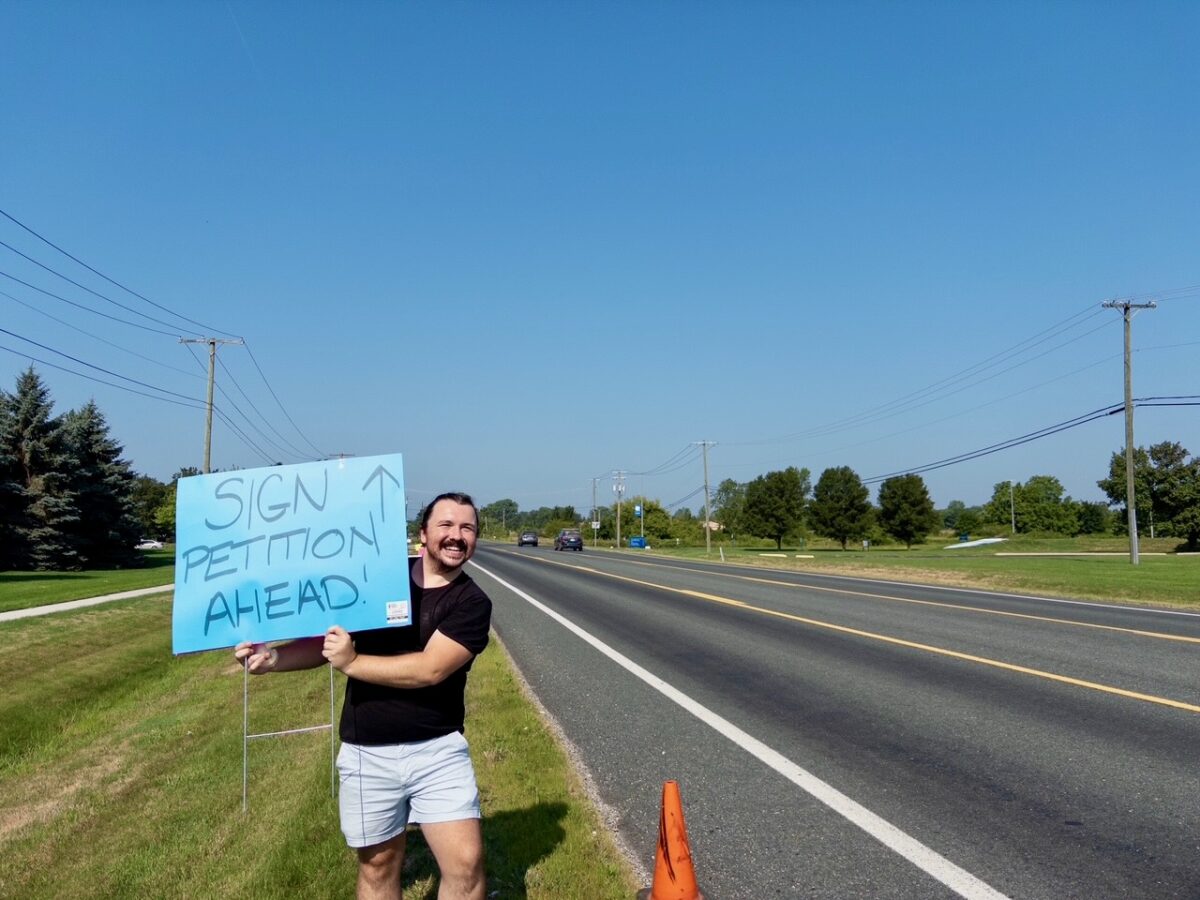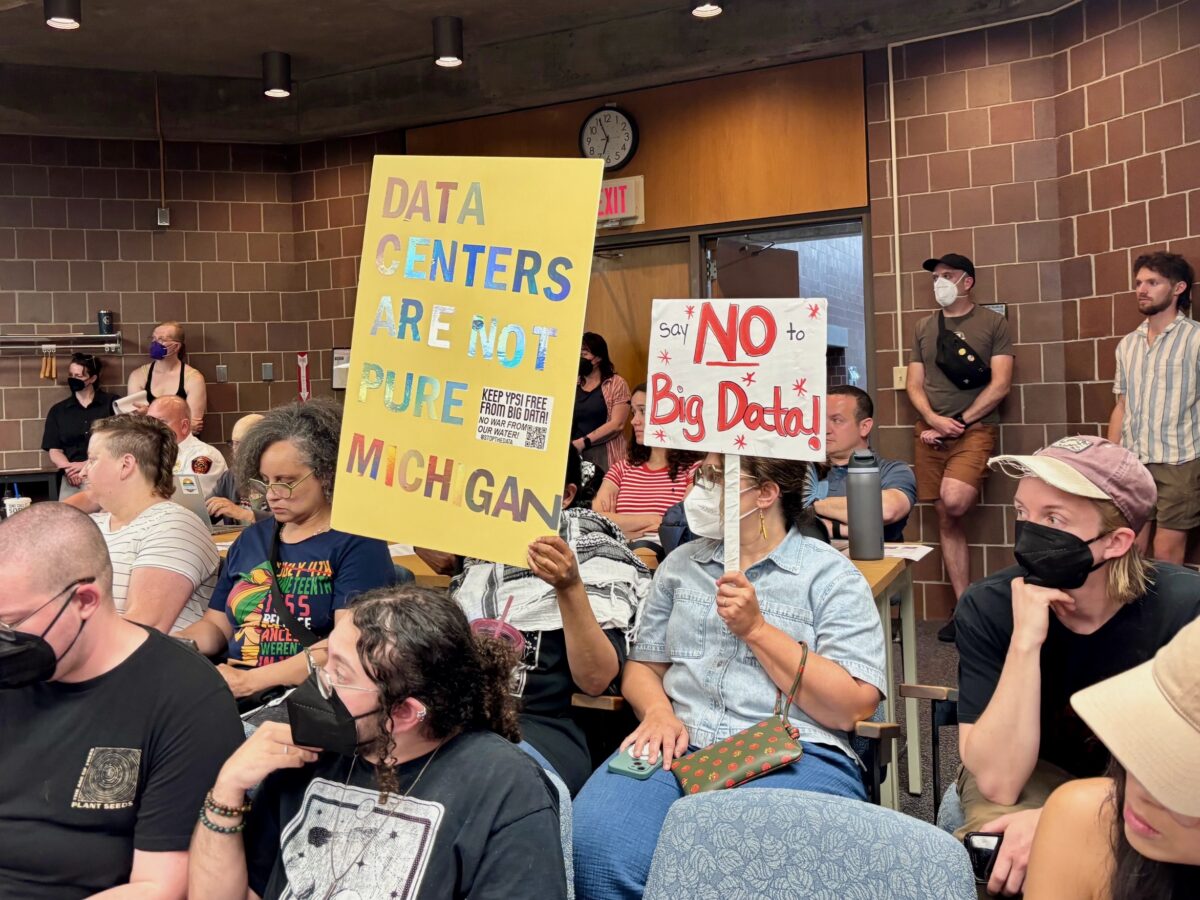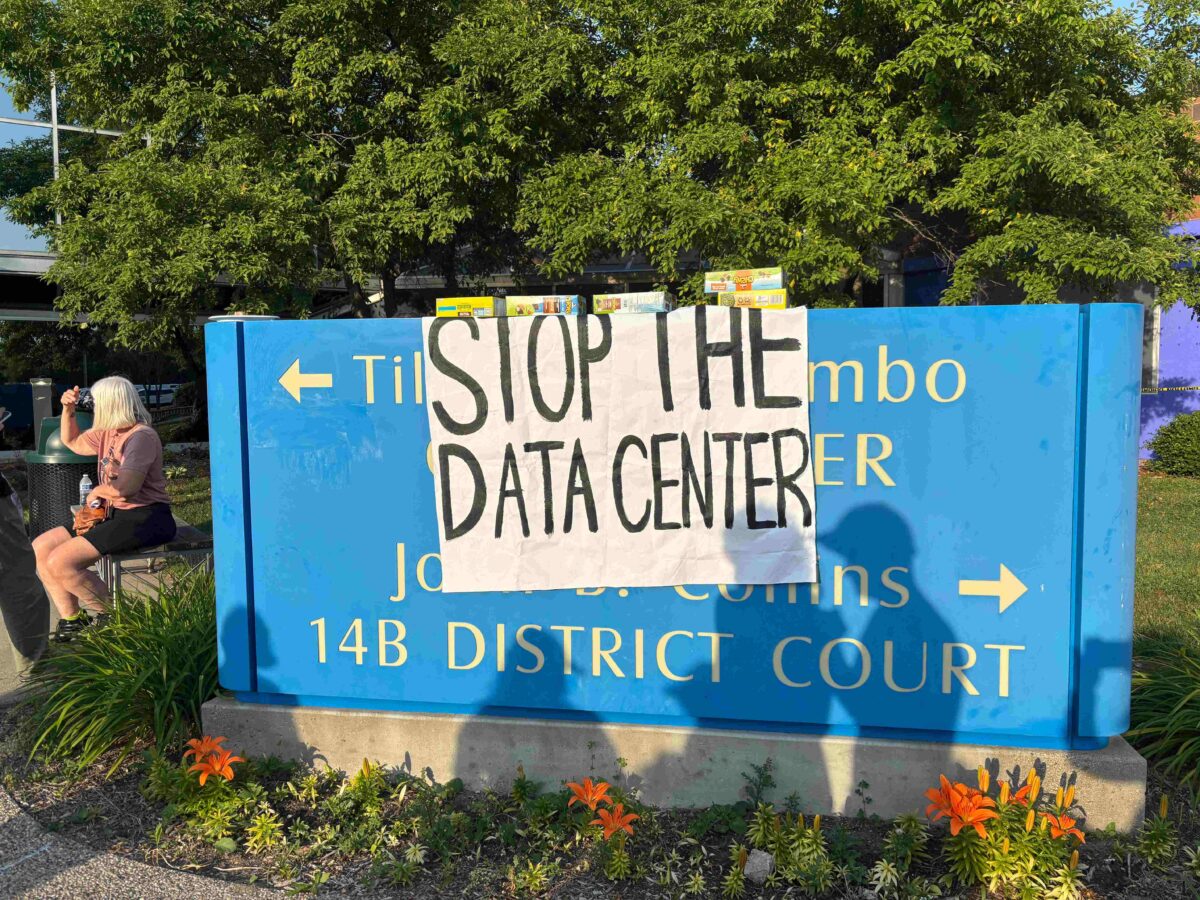Overview:
-Ypsilanti Township officials are pushing back against the University of Michigan's plans for a $1.2 billion data center.
-The university says it's reevaluating an alternate site formerly occupied by General Motors near Willow Run Airport.
-U.S. Rep. Debbie Dingell: "If I had to make a bet, it probably won't go there," referring to the project being built in Ypsilanti Township.
The Ypsilanti Township Board of Trustees adopted a resolution Tuesday urging the University of Michigan and Los Alamos National Laboratory to move a planned $1.2 billion data center project away from a site on the Huron River.
The proposed new location on Wiard Road, adjacent to the West Willow neighborhood, raises concerns the development could add pollution to an overburdened neighborhood.
Expressways encircle this area, which is also impacted by pollution from Willow Run Airport, Courtenay Hall, Van Buren Township resident and constituent representative for the Michigan Democratic Party’s Progressive Caucus, told the Ypsilanti Township board.
“And who sits in the middle of all of that?” Hall asked. “The working class and predominantly Black population in the West Willow neighborhood.”
Township board officials said the already industrialized site near the airport can better accommodate the University of Michigan and Los Alamos data center project, which is planned for 144.5 acres of land on Textile Road south and east of Ford Lake Dam and North Hydro Park, according to university documents.
In a memorandum accompanying the resolution, township officials said the university’s plans to construct the facility on Textile Road raises “environmental concerns, health concerns, safety concerns and noise concerns.”
Residents have previously voiced concerns about the facility’s potential water and energy demands and the presence of Los Alamos in the community, which they said could support drone warfare and surveillance technologies. Los Alamos was instrumental in the development of the atomic bomb and provides scientific and engineering support for national security programs, according to the Department of Energy.
At a Wednesday night town hall in Woodhaven, U.S. Rep Debbie Dingell (D-Ann Arbor), whose district includes Ypsilanti Township, expressed doubt about the project’s future in the township.
“If I had to make a bet, it probably won’t go there,” she said.
When reached for further comment, Dingell told Planet Detroit that she isn’t involved in U of M’s internal deliberations.
Dingell argued the facility is important for Michigan, adding that it’s a national lab and not the kind of data center that faces opposition elsewhere.
“It brings prestige, and it becomes a permanent source of jobs and investments … but I think we have to do a far better job of being transparent (and) communicating about what it is.”
Ypsilanti Township trustee: ‘We’re struggling’
During Tuesday’s board meeting, officials expressed distrust in the Ann Arbor-based university. Ypsilanti Township Attorney Doug Winters said the university misled the township and state officials about the size of the project.
The Michigan Economic Development Corporation, which distributes taxpayer funded grants and subsidies, provided the project with a $100 million grant in December 2024.
Winters said U of M previously negotiated with the American Center for Mobility for 18 months about the Wiard Road site without township officials’ knowledge.
Trustee Karen Lovejoy Roe said Tuesday that U of M is moving into one of Washtenaw County’s lower income communities, where there is a high proportion of Black and brown residents, while failing to assist with municipal services because of its tax-exempt status.
“We’re struggling and, U of M, they have to know that,” she said.
The township is still recovering from a decline in property taxes caused by the 2008 financial crisis and would lose tax revenue from having land taken off the tax roll for the data center, Lovejoy Roe said.
U of M spokesperson Kay Jarvis told Planet Detroit in a statement that the university is committed to being a good neighbor and operating the facility in a way that protects the Huron River and minimizes noise, emissions, and other environmental impacts.
“The area’s existing light industrial zoning, wide roads, and infrastructure make it well suited for this purpose, and our preliminary site plan positions the buildings to maximize distance from nearby parks and protect natural features,” Jarvis said, referring to the Textile Road property for which the University of Michigan regents approved the $8.1 million purchase on June 12, subject to environmental review and due diligence.
Along with the resolution to request a change in location for the data center, Ypsilanti Township trustees approved a measure to consider a zoning change that could disallow data centers in certain areas, including the Textile Road site.
The board voted to hire attorney Grant Trigger to prepare for a relocation of the data center project or to analyze environmental concerns if U of M continues to pursue the Textile Road site. Trigger previously served as cleanup manager for the RACER Trust, which was formed after GM’s bankruptcy and tasked with rehabilitating GM properties.
MORE PLANET DETROIT REPORTING
Ballot drive kicks off to put Washtenaw County data center decision in hands of voters
Augusta Township residents are gathering signatures to challenge a rezoning decision for a planned $1 billion data center. Concerns over rising utility costs, environmental impact, and grid strain drive their efforts.
University of Michigan’s ‘big bad data center’ faces opposition from top Ypsilanti Township official
Supervisor Brenda Stumbo says University of Michigan misled her about the size of the project and voiced concerns about noise, vibration, and possible environmental impacts.
Ypsilanti Township residents speak out against University of Michigan’s ‘biggest, baddest’ data center
In Ypsilanti Township, residents are sounding alarms over a $1.2 billion data center project by the University of Michigan and Los Alamos National Laboratory, citing fears of rising utility costs, environmental harm, and the advancement of surveillance technologies.
Alternative Ypsilanti Township location a pollution hot spot
Township officials said a former General Motors site at the American Center for Mobility next to the West Willow neighborhood is large enough for the data center and has the necessary utility connections, while also being zoned for industry.
Jarvis said the university has re-engaged with the American Center for Mobility about potentially utilizing the Wiard Road site, although she did not say whether Ypsilanti Township officials would be involved in negotiations.
Township officials asked the college to reevaluate the American Center for Mobility site, Jarvis said. “This site had been investigated and reviewed for a lengthy time and the university had decided to move on with other more viable sites. However, at the request of the township, U-M has re-engaged with ACM to evaluate the viability of their site for this facility,” she said.
“We will be keeping the township informed of our re-evaluation with ACM officials,” she said.
Hall, the Van Buren Township resident, said the university and Los Alamos should be looking for other, less populated areas for the development.
“Just because the area is industrialized doesn’t mean we should keep adding to that industrialization,” she said.
According to MiEJScreen, Michigan’s environmental justice screening tool, the West Willow neighborhood is in the 85th percentile, while areas to its north are in the 88th percentile. These scores indicate well above average pollution exposure and sensitive populations.
Diesel generators, used to provide data centers with backup power during power outages, emit carbon monoxide and nitrogen oxides, adding to ozone formation.
Chris Kolb, University of Michigan vice president for government relations, said the project’s generators will not run on diesel and are intended to meet 20% of the site’s energy load.
“They safely ramp down equipment to a stable state to wait for power to come back on, not to keep the entire facility running continuously,” he told Planet Detroit.
The university did not say what kind of backup power it would be using instead of diesel.
‘Epitome of arrogance’: distrust of U of M grows among township officials
Township attorney Winters said the University of Michigan engaged in a “bait and switch” with both township and state officials when it proposed a 20-acre site for the data center, before going on to seek additional acreage.
The University of Michigan Board of Regents approved the purchase of the initial 19.68-acre parcel for $1.5 million in October 2024, subject to environmental review and due diligence.
The University of Michigan’s application for $100 million in funding from the Michigan Strategic Fund on Dec. 10, 2024, said the data center will be located on a “20-acre property in Ypsilanti Township.”
On June 12, the Board of Regents approved the acquisition of another 124.68 acres on Textile Road.
U of M’s Kolb said the university moved to expand the project after DTE Energy identified limitations with a planned substation site, and the college presented the acquisition of the adjacent 124-acre site to the Board of Regents for approval.
“U-M’s Community Relations team reached out to township leadership to give advance notice of the pending decision,” Kolb said.
Now that U of M has restarted talks about the Wiard Road site, Winters told Planet Detroit it would be the “epitome of arrogance” if the university does not give township officials a seat at the table.
During Tuesday’s meeting, Ypsilanti Township Treasurer Stan Eldridge said he no longer agreed with pushing the University of Michigan to find another site for the data center within the township.
“I have a hard time wanting U of M in this community because I don’t trust them,” he said.





